This month: “The Amazing Spider-Man 2”, “Boyhood”, “Coming Home”, “Half of a Yellow Sun”, “Ilo Ilo”, “Irma Vep”, “Kumiko, the Treasure Hunter”, “Lilja 4-ever” (pictured above), “Monkey Business”, “Obvious Child”, “Permanent Record”, “Short Term 12”, “The Temp”, “They Came Together” and “The Voices”.
I’m also going to use this spot to promote a few articles I’ve written elsewhere, including 2,000 words on “Gregg Araki’s misfits and losers”, a piece on “Six awesome-looking Kickstarter music documentaries”, an argument on why “Richard Linklater’s Boyhood is his best since Dazed and Confused”, an interview with Anthony Chen, and a preview of this year’s Hot Docs festival in which I reviewed: The Case Against 8, The Overnighters and Watchers of the Sky. Most importantly (maybe wrong word to use), I spent aaaaages on a feature called “Tracing Richard Ayoade’s cinematic influences” with some image-heavy evidence. Now I’m going to head to the shops to buy some biscuits, but I guess you didn’t need to know that.
The average score this month is 6.13/10. You might also notice I went to Sundance London, which makes this a very special blog post. Film of the month is Boyhood or The Voices, neither of which will come out for a few months. Sorry. Follow @halfacanyon for more.
The Amazing Spider-Man 2 (2014) – 6.5/10
Director: Marc Webb
Writers: Alex Kurtzman, Roberto Orci, Jeff Pinker
Starring: Andrew Garfield, Emma Stone, Dane DeHaan, Jamie Foxx, Sally Field
“Soon everyone in the city will know what it feels like to live in a world without power. Without mercy. Without Spider-Man.”
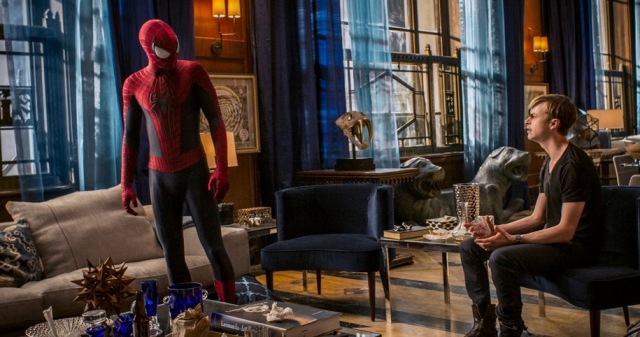 Like a controversial Oxford comma, New York persistently wonders if it needs Spider-Man. That floating paranoia is redolent of writers trying to instil something new to a story that was adequately covered by Sam Raimi not that long ago. At the same time, this new incarnation of the webbed superhero is aiming for a middle-ground that’s not as ambitious as Nolan or Marvel, but safe enough to avoid any Green Lantern box office disaster. Let’s be honest: the “Amazing” isn’t fooling anyone. This is the same story with a slightly altered cast. And, like the previous instalment, it’s light entertainment that’s more fun than its rivals, yet still bogged down by superhero cliches.
Like a controversial Oxford comma, New York persistently wonders if it needs Spider-Man. That floating paranoia is redolent of writers trying to instil something new to a story that was adequately covered by Sam Raimi not that long ago. At the same time, this new incarnation of the webbed superhero is aiming for a middle-ground that’s not as ambitious as Nolan or Marvel, but safe enough to avoid any Green Lantern box office disaster. Let’s be honest: the “Amazing” isn’t fooling anyone. This is the same story with a slightly altered cast. And, like the previous instalment, it’s light entertainment that’s more fun than its rivals, yet still bogged down by superhero cliches.
The secret weapon – or, basically, Marc Webb’s equivalent of a spider sense – is Dane DeHaan’s unsettling turn as Harry Osborn, a childhood friend of Peter Parker who turns into some weird goblin creature. (Just a reminder to check Facebook to see how your school friends are doing.) DeHaan is becoming an example of Chekhov’s “gun” analogy; following Chronicle and Kill Your Darlings, he will always transform into an evil persona by the final act. His eyes are certainly more menacing than anything James Franco could muster previously.
Although I hardly consider 500 Days something to proud of, Webb’s background is romantic comedies. Garfield and Stone don’t have the chemistry intended, but it’s more tolerable than any upside-down kisses. The human element is Webb’s core to such an extent that one villain, The Rhino, appears to just be Paul Giamatti dressed up as a 21st century pachyderm. When it comes down to fight scenes, the tactic is to discombobulate the viewer: shake the camera, toss around electrical sparks, and bring the noise. The real fight scenes are verbal.
The weak link of the cast? Probably Jamie Foxx as Electro, whose genesis involves electric eels and clumsiness. He echoes Mr Freeze, except no one will be watching a YouTube compilation of his lines. Luckily, there’s always DeHaan around the corner, even if at times he’s auditioning for a Bond villain (and totally deserves it). Similarly, Garfield has perfected the art of nimbly bleating one-liners at inappropriate moments, rather like a hairdresser who won’t stop talking. That should be the next villain.
Boyhood (2014) – 9.5/10
Writer/Director: Richard Linklater
Starring: Ellar Coltrane, Patricia Arquette, Ethan Hawke
“Photography doesn’t add anything. Art does.”
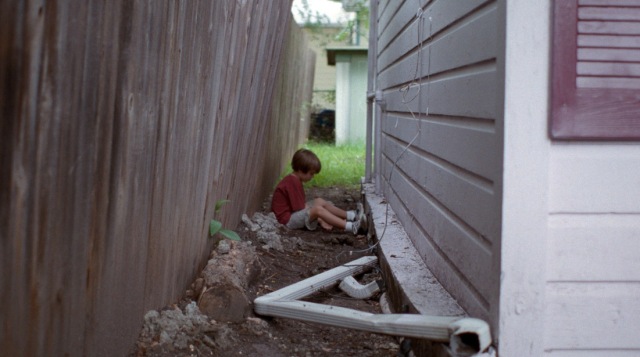 Believe the hype. By which I mean, read this feature I wrote for Grolsch Film Works about “Why Richard Linklater’s Boyhood is his best since Dazed and Confused”.
Believe the hype. By which I mean, read this feature I wrote for Grolsch Film Works about “Why Richard Linklater’s Boyhood is his best since Dazed and Confused”.
Coming Home (1978) – 6.5/10
Director: Hal Ashby
Writers: Robert C. Jones, Waldo Salt
Starring: Jane Fonda, Jon Voight, Penelope Milford, Robert Carradine, Bruce Dern
“How can they give you a medal for a war they don’t even want you to fight?”
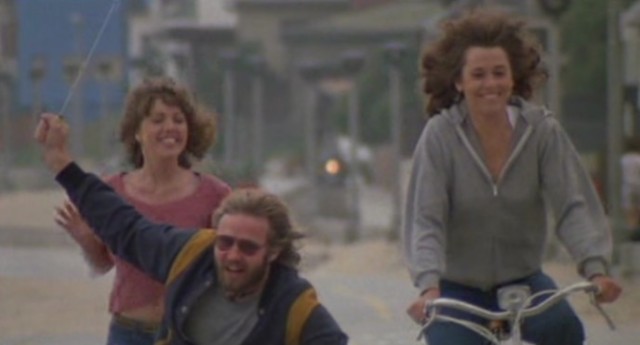 From “Ruby Tuesday” to “Strawberry Fields Forever”, slow melancholia permeates through Coming Home. And with good reason. The Vietnam War serves as a backdrop for a painful love triangle made up of three contrasting victims at the corners. Bob (Dern) is the bitter husband who heads off, leaving Sally (Fonda) helplessly alone; she passes the time (and preserves sanity) by volunteering at the hospital, and develops a relationship with Luke (Voight), a paraplegic patient.
From “Ruby Tuesday” to “Strawberry Fields Forever”, slow melancholia permeates through Coming Home. And with good reason. The Vietnam War serves as a backdrop for a painful love triangle made up of three contrasting victims at the corners. Bob (Dern) is the bitter husband who heads off, leaving Sally (Fonda) helplessly alone; she passes the time (and preserves sanity) by volunteering at the hospital, and develops a relationship with Luke (Voight), a paraplegic patient.
The gentle drama ticks along with the mechanics of a traditional storyline – somewhat speeded up unnaturally at times during dramatic set-pieces, as are the political outbursts – but gains an edge through the war’s persistent off-screen presence. Ashby’s better-known Harold and Maude is perhaps the more memorable take on love affairs with unspoken obstacles. However, Sally sees something in Luke missing in Bob, even if it’s likely that they’re both the same person: embittered by the war, just at different stages.
Perhaps the clincher is Sally admitting, “You know, I’ve never been on my own before.” She doesn’t mean to stop there – but doesn’t know which words to add.
Half of a Yellow Sun (2014) – 5/10
Director: Biyi Bandele
Writers: Biyi Bandele, Chimamanda Ngozi Adichie (novel)
Starring: Thandie Newton, Chiwetel Ejiofor, Onyeka Onwenu
“It’s bland tasting – which is better than bad tasting.”
 I wrote a review for Grolsch Film Works and ended it with a rice metaphor.
I wrote a review for Grolsch Film Works and ended it with a rice metaphor.
Ilo Ilo (2014) – 8/10
Director/Writer: Anthony Chen
Starring: Koh Jia Ler, Chen Tianwen, Yeo Yann Yann, Angeli Bayani
 I interviewed the director and he described the casting process as making Singapore’s answer to The 400 Blows. You can read that… here.
I interviewed the director and he described the casting process as making Singapore’s answer to The 400 Blows. You can read that… here.
Irma Vep (1996) – 8.5/10
Director/Writer: Olivier Assayas
Starring: Maggie Cheung, Jean-Pierre Léaud, Nathalie Richard
“I don’t think she knows why she’s here or what René expects of her.”
Kumiko, the Treasure Hunter (2014) – 5.5/10
Director: David Zellner
Writers: David Zellner, Nathan Zellner
Starring: Rinko Kikuchi, Nobuyuki Katsube, David Zellner
“I wanna go Fargo.”
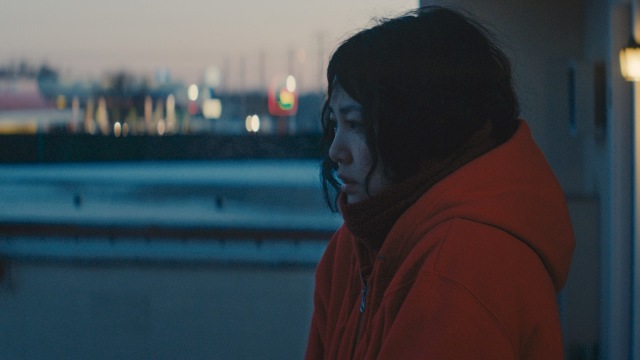 Beforehand, I was concerned Kumiko would effectively be a cinematic mocking of a stupid Japanese woman. Well, it sort of is and sort of isn’t. That may not be helpful, but neither was David Zellner’s Q&A following the screening.
Beforehand, I was concerned Kumiko would effectively be a cinematic mocking of a stupid Japanese woman. Well, it sort of is and sort of isn’t. That may not be helpful, but neither was David Zellner’s Q&A following the screening.
The story involves Kumiko (Kikuchi) chancing upon a VHS of Fargo, the Coen Brothers film with the infamous opening pretending to be based upon real events. By measuring the screen and stealing a map from the library, she pinpoints where Steve Buscemi’s character must have buried the suitcase. Her trip to Minnesota is a series frostbitten mistranslations; a local sheriff asks a Chinese restaurant owner to translate Japanese, and is astounded to discover there’s no overlap.
Kumiko’s motives aren’t that clear. Mainly as she rarely speaks, unless if it’s to her ramen-chewing rabbit. She’s a product of modern office loneliness that interprets “The American Dream” through a fictional suitcase trapped under thick snow. The film doesn’t delve further into that psychological landscape, despite purporting to be from her POV. Instead, a mythical doom envelops the screen: the sound design is haunting, the cinematography crisply plucks out the jagged edges of everyday objects.
There are even elements of Jarmusch’s deadpan humour in places (particularly Mystery Train and The Limits of Control). But Zellner lacks Jarmusch’s rhythm or poetry, and, while technically astute, is rather hollow. At least she didn’t pick up a copy of The Ladykillers.
Lilja 4-ever (2002) – 8.5/10
Director/Writer: Lukas Moodysson
Writers: Oksana Akinshina, Artyom Bogucharsky, Lyubov Agapova, Liliya Shinkaryova
“You didn’t get any letters today. I think your mother’s forgotten you.”
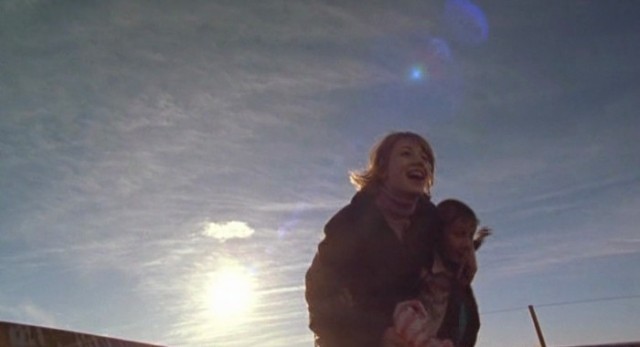 After the light comedy of Fucking Amal and Tillsammans, Moodysson slams a crushing blow to viewer happiness with the deceivingly titled Lilja 4-ever. I think it might even be more traumatic than All About Lily Chou-Chou.
After the light comedy of Fucking Amal and Tillsammans, Moodysson slams a crushing blow to viewer happiness with the deceivingly titled Lilja 4-ever. I think it might even be more traumatic than All About Lily Chou-Chou.
Like a rock-and-roll Dancer in the Dark, Moodysson opens with the sounds of German metal outfit Rammstein (a trick that preceds Nymphomaniac by more than a decade). Lilja (Akinshina) runs for her life, rather tragically as part of a screenplay based on a real human trafficking incident. She comes across ill luck at every plot turn, while her fantasies about escape are never more than that. In other words, Moodysson thrusts the emotional torture on the screen, with the von Trier-style playfulness kept separate from the central arc.
16-year-old Lilja isn’t fortunate enough to be born into the family safeness of We Are the Best! or Tilsammans. In a grey part of Russia, her mother abandons her to fly to America with a new boyfriend. After ten minutes, Lilja is in tears and yet the heartbreak has barely started. The circular warning signs aren’t a coincidence, and Moodysson’s political intent proves to be a catalyst for awareness and anger. Without a family, she’s alone in a tiny, damp apartment – imagine Home Alone without the fun gadgets, without Christmas, and the burglars are rapists.
Every mistake Lilja subsequently makes is obvious and understandable, as is Moodysson’s religious response: if only she had some sort of guide. Lilja is betrayed when her best friend Natasha indirectly sends them both towards prostitution. Subsequently, her only friend left is Volodya (Bogucharsky), a younger boy who she only spends time with because there’s no one left. (Think back to the scene in Fucking Amal when Agnes complains about forced friendships being worse than loneliness.) The punctured basketball is a metaphor too far, but the emotional turmoil is effective.
By the time Lilja is selling her body (as opposed to rumours started by Natasha), the viewer can already empathise. What happens next is terrifying and paints Lilja 4-ever as both a horror and warning. The Christianity aspect is obvious, as Lilja could do with some guidance in the absence of a parent. But Moodysson’s religious fervency is diluted by a punk attitude full of vitriol; any hope, even false beliefs dreamt up on a prison floor, can inflate a punctured basketball.
Monkey Business (1952) – 3/10
Director: Howard Hawks
Writers: Ben Hecht, Charles Lederer, I.A.L. Diamond
Starring: Cary Grant, Ginger Rogers, Marilyn Monroe
“As soon as I put on some clothes I’ll try to fix some of the wreckage I’ve made of our lives.”
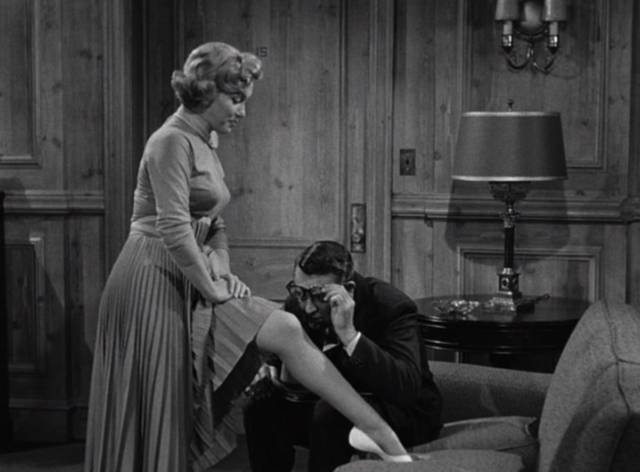 The writers have an astounding list of credits, including many of Billy Wilder’s achievements. The same can also be said about the cast and the director – the latter with the added bonus of almost being the inspiration for The Aviator. However, Monkey Business doesn’t deserve much more than an introduction which amounts to a weak punchline.
The writers have an astounding list of credits, including many of Billy Wilder’s achievements. The same can also be said about the cast and the director – the latter with the added bonus of almost being the inspiration for The Aviator. However, Monkey Business doesn’t deserve much more than an introduction which amounts to a weak punchline.
Grant develops an anti-ageing potion; hilarity doesn’t ensue. The screwball elements continue like The Hangover for the ‘50s, complete with light sexism, light racism and animal cameos.
Obvious Child (2014) – 7.5/10
Director: Gillian Robespierre
Writers: Gillian Robespierre, Karen Maine, Elisabeth Holm
Starring: Jenny Slate, Jake Lacy, Gaby Hoffmann
“I’m not the angel on top. I’m like the menorah on top that burns it down.”
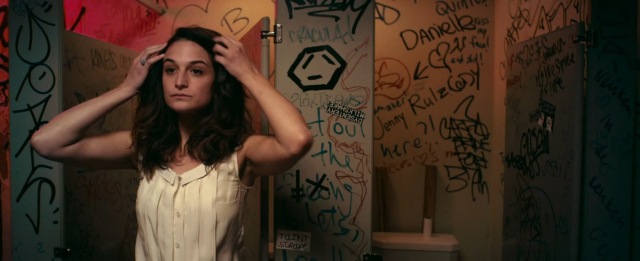 Robespierre described Obvious Child in the screening’s Q&A as a response to Juno and Knocked Up. In other words, a comedy where the female lead can be funny. have an abortion without being judged. The dramedy goes further by casting the excellent Jenny Slate in the main role of Donna Stern: a stand-up comedian whose act is an amalgamation of gross-out humour and over-sharing. Not only has she urinated in every swimming pool she’s been in, she’s not afraid to let you know, and it’s oddly charming.
Robespierre described Obvious Child in the screening’s Q&A as a response to Juno and Knocked Up. In other words, a comedy where the female lead can be funny. have an abortion without being judged. The dramedy goes further by casting the excellent Jenny Slate in the main role of Donna Stern: a stand-up comedian whose act is an amalgamation of gross-out humour and over-sharing. Not only has she urinated in every swimming pool she’s been in, she’s not afraid to let you know, and it’s oddly charming.
The immediate comparison is with Lena Dunham’s Girls, particularly the early episode with Jessa’s abortion. However, Obvious Child pertains its own rhythm and warmth, largely carried by Slate’s emotional depth and tremendous comic timing. Also, she is a pro at acting surprised while squeezed inside a cardboard box.
Permanent Record (1998) – 4/10
Director: Marisa Silver
Writers: Jarre Fees, Karry Ketron, Alice Liddle
Starring: Keanu Reeves, Pamela Gidley, Michelle Meyrink, Jennifer Rubin
“How’s the show going, buttercup?”
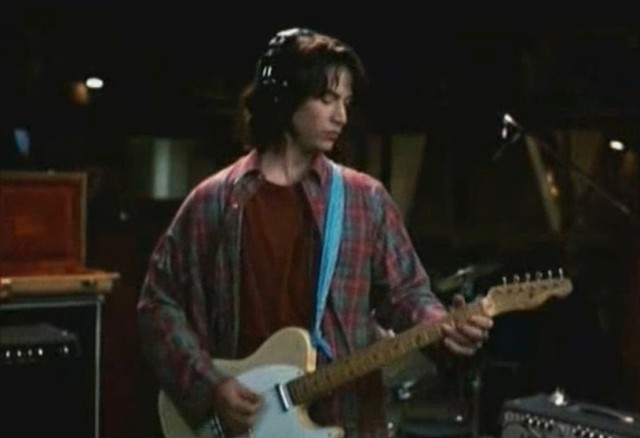 Despite its title, Permanent Record is a forgettable drama about the aftermath of a teenager’s suicide – primarily the shock and mourning of his friends who never saw it coming. There isn’t an obvious catalyst like drugs or abuse; more boredom and an underlying depression, despite a promising future. Of course, everyone’s sad. The pupils practise songs he wrote and visit his place of death. Tears are shed, beers are shared.
Despite its title, Permanent Record is a forgettable drama about the aftermath of a teenager’s suicide – primarily the shock and mourning of his friends who never saw it coming. There isn’t an obvious catalyst like drugs or abuse; more boredom and an underlying depression, despite a promising future. Of course, everyone’s sad. The pupils practise songs he wrote and visit his place of death. Tears are shed, beers are shared.
Slightly watchable as unlikely popcorn fare, like a tragic episode of a soap. Permanent Record is better than that, but not by much. Keanu is decent, and Gidley is even better as the mourning girlfriend (ex-girlfriend?). It’s all fairly standard fare, with a notable exemption being the headmaster’s reluctance to pay tribute in case it “condones” suicide – a subplot relegated below a rock soundtrack.
Short Term 12 (2013) – 7/10
Director/Writer: Destin Cretton
Starring: Brie Larson, John Gallagher Jr, Kaitlyn Dever, Rami Malek, Keith Stanfield
“Maybe I’ll cut myself right now and you’ll all lose your fucking jobs.”
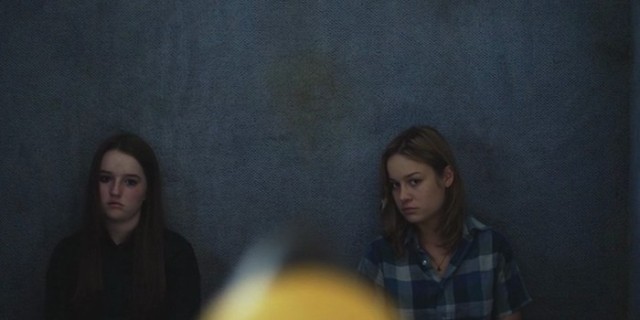 One of the understated qualities of Short Term 12 is its sense of humour, despite the premise: a foster-care home for troubled children, with the carers having their own emotional struggles. Larson is superb as Grace, the main carer in focus. Well, “superb” is the wrong word, given her main qualities as someone truly human. It is through her empathetic body language and affection that she communicates with the most reluctant of adolescents (even the ones who spit in her face and run out the front door).
One of the understated qualities of Short Term 12 is its sense of humour, despite the premise: a foster-care home for troubled children, with the carers having their own emotional struggles. Larson is superb as Grace, the main carer in focus. Well, “superb” is the wrong word, given her main qualities as someone truly human. It is through her empathetic body language and affection that she communicates with the most reluctant of adolescents (even the ones who spit in her face and run out the front door).
The drama burns slowly; cliched set pieces are avoided until the latter stages, which sadly unsettle the natural tone. It takes a while to realise how Cretton deftly draws in the audience through mundane conversations and the kind of anecdotes that rarely appeal to friends of friends. By the end, it’s apparent that the highlights aren’t the screaming matches or emotional breakdowns, but actually the characters chatting about old acquaintances and coffee.
The Temp (1993) – 4/10
Director: Tom Holland
Writers: Kevin Falls, Tom Engleman
Starring: Timothy Hutton, Lara Flynn Boyle, Dwight Schultz, Oliver Platt, Faye Dunaway
“I just want to let you know: I take no prisoners and I eat the wounded.”
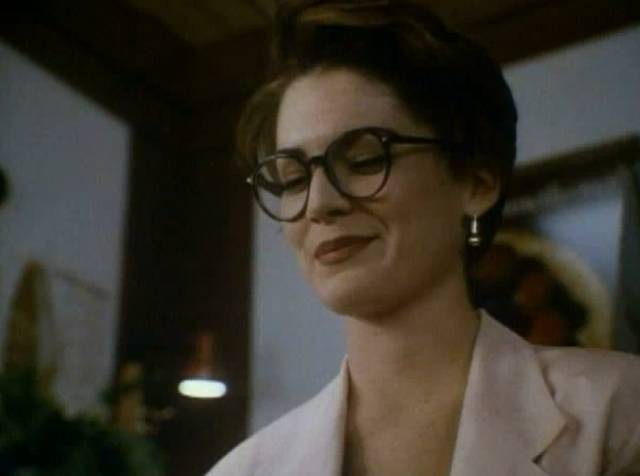 The Temp is as forgettable and unambitious as the title suggests. Office politics play out in a manner that means I didn’t need to look up the credits to know the director and screenwriters are men. Hutton stars as a divorced employee who resists – somewhat boldly, in the film’s eyes – the temptation of a new temp, played by high-heeled Lara Flynn Boyle. (I think the title is a pun on “temptation”. That, and someone pouring coffee into a pot plant, are the only smart moments.)
The Temp is as forgettable and unambitious as the title suggests. Office politics play out in a manner that means I didn’t need to look up the credits to know the director and screenwriters are men. Hutton stars as a divorced employee who resists – somewhat boldly, in the film’s eyes – the temptation of a new temp, played by high-heeled Lara Flynn Boyle. (I think the title is a pun on “temptation”. That, and someone pouring coffee into a pot plant, are the only smart moments.)
It’s not exactly All About Eve. Well, it doesn’t deserve to be in the same sentence. But Boyle rises to the position of Hutton’s secretary, helping him deliver sterling work, but is she trying to overtake him? It’s hard to care when the film is more preoccupied with Boyle’s provocative behaviour that’s a few beats away from soft pornography.
“Why don’t you come in for a swim?” asks Hutton. “This water could do with some warming up.”
She responds, without irony, “Let’s fuck underwater.”
They Came Together (2014) – 5/10
Director: David Wain
Writers: David Wain, Michael Showalter
Starring: Paul Rudd, Amy Poehler, New York, Ed Helms, Cobie Smulders
“I’d rather be alone and happy, than with you and unhappy.”
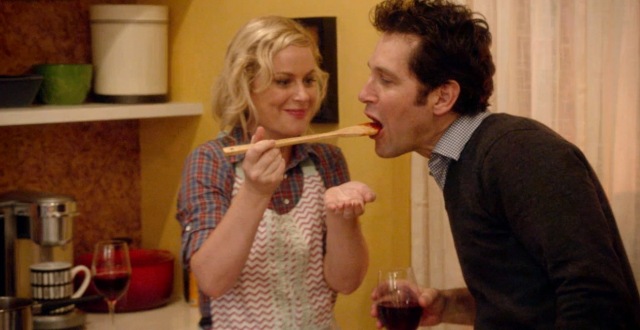 Mainstream romantic comedies are increasingly winking to the camera, laughing at their own cliches, or having characters reference their own DVD collections. If the two leads fall in love in a manner reminiscent of When Harry Met Sally, that could be deliberate because they own it on VHS, DVD and Blu-ray.
Mainstream romantic comedies are increasingly winking to the camera, laughing at their own cliches, or having characters reference their own DVD collections. If the two leads fall in love in a manner reminiscent of When Harry Met Sally, that could be deliberate because they own it on VHS, DVD and Blu-ray.
With the genre already establishing a heightened meta-element, David Wain isn’t exactly breaking new ground with its gentle pastiche. They Came Together probably peaks at the promotional poster campaign that uses critical quotes from Deadline referring to casting, and a promise that New York will be so prominent that it’s practically a character. It does feature a mouthwatering cast who are not only trusted comic performers (many are Wain regulars), but have earned paycheques through the material being mocked – Rudd is a particularly apt choice for a non-threatening lead who, as the script jokes, looks as Jewish as you can be without actually being Jewish.
The film itself lingers in an odd funk that’s occasionally amusing, always likeable, yet rarely inspirational. Rhythmically, the stop/start structure (basically exemplifying cliches at a walking speed) would probably benefit from 10-minute chunks in a web series, rather like Wain’s involvement with Wainy Days and Childrens Hospital.
The Voices (2014) – 8/10
Director: Marjane Satrapi
Writer: Michael R Perry
Starring: Ryan Reynolds, Gemma Arterton, Anna Kendrick
“Mr Whiskers?”
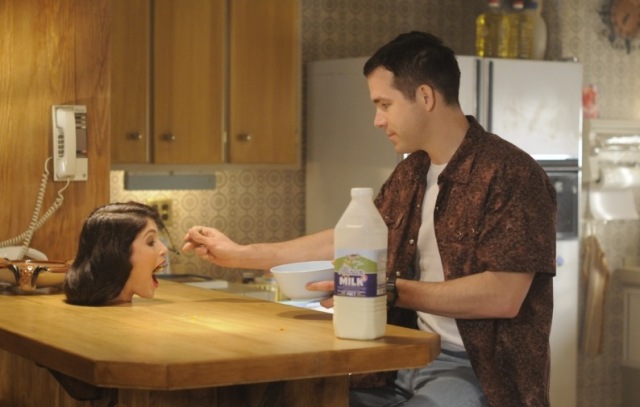 My Sundance London experience ended with Ryan Reynolds on stage for a Q&A session. There was some shock that a Hollywood star would be slumming it in Cineworld Screen 7. But the bigger shock was from learning Reynolds can actually act and is largely responsible for The Voices veering into an area of poignancy.
My Sundance London experience ended with Ryan Reynolds on stage for a Q&A session. There was some shock that a Hollywood star would be slumming it in Cineworld Screen 7. But the bigger shock was from learning Reynolds can actually act and is largely responsible for The Voices veering into an area of poignancy.
Reynolds to an extent plays the main three roles. In addition to portraying a factory worker called Jerry, Reynolds also voices his two pets: a dour dog with a conscience, and an evil cat that encourages his owner to throw away the pills. For, you see, Jerry is a schizophrenic who floats in a happier, colourful world that can only exist without medication. Satrapi’s colour palette defines an protective imagination that’s full of wonder and, importantly, devoid of loneliness. If God won’t answer his prayers, then at least there’s always a goldfish available for small talk. (“Goldfish, why am I a blogosphere punchline when I was in goddamn Adventureland?” “I can’t remember – my memory’s not so great.”)
I was worried that The Voices would descend into mocking mental illness. Luckily, Perry’s screenplay is more nuanced and is ultimately concerned with the concept of religion: choosing which voices to hear. Jerry is fully aware that his cat and dog can’t talk – Mr Whiskers frequently reminds him of this – and actively flushes away pills to preserve the fantasy. The viewer is fully inside his mind, right down to the apartment’s wallpaper possessing an extra coating of paint that we know isn’t there.
Arterton and Kendrick aren’t blessed with the most sophisticated roles, given they’re just oblivious co-workers – and that’s down to the hollowness of their social interactions with Jerry. Similarly, neither could guess that Jerry’s homelife doesn’t befit his chiselled jaw. The pair spring to life in Jerry’s imagination, firmly creating an image that succinctly dissects the tawdriness of romantic comedies. And as a horror spectacle, it’s a rare example that takes advantage of the accepted belief that serial killers are more interesting than their victims.
As I’m sure most pets do, Jerry’s cat advises him on whom to kill – the results are vividly played for laughs and will stick in the memory. However, it’s the unexpected solo performance from Reynolds (yeah, this is more Buried than The Proposal) that elevates the fucked up humour into something surprisingly moving. Jerry is played with deadpan dedication and the eyes of a psychopath; a few blinks from a manic breakdown. Funnily enough, his prayer to God comes across as more absurd than an argument with his dog about whether to change the channel.
There was an oft-made point that much of the positive reactions for Her were made in post-screening tweets. I drove home to the woods to recommend The Voices to my cat.
Follow @halfacanyon for more.

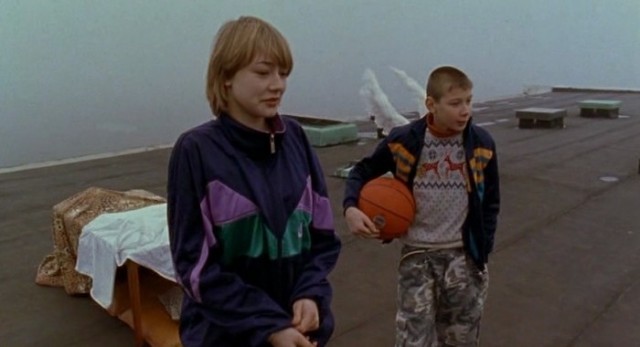
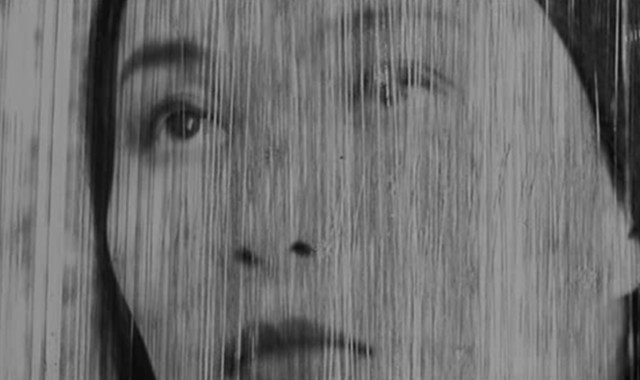
Pingback: Kenicky’s 2014 film roundup | HALF A CANYON FILM BLOG: A traffic jam when you're already a plate
Pingback: Kenicky’s 2015 film roundup | HALF A CANYON FILM BLOG: A traffic jam when you're already a plate
Pingback: Kenicky’s 2015 film roundup | HALF A CANYON FILM BLOG: A traffic jam when you're already a plate